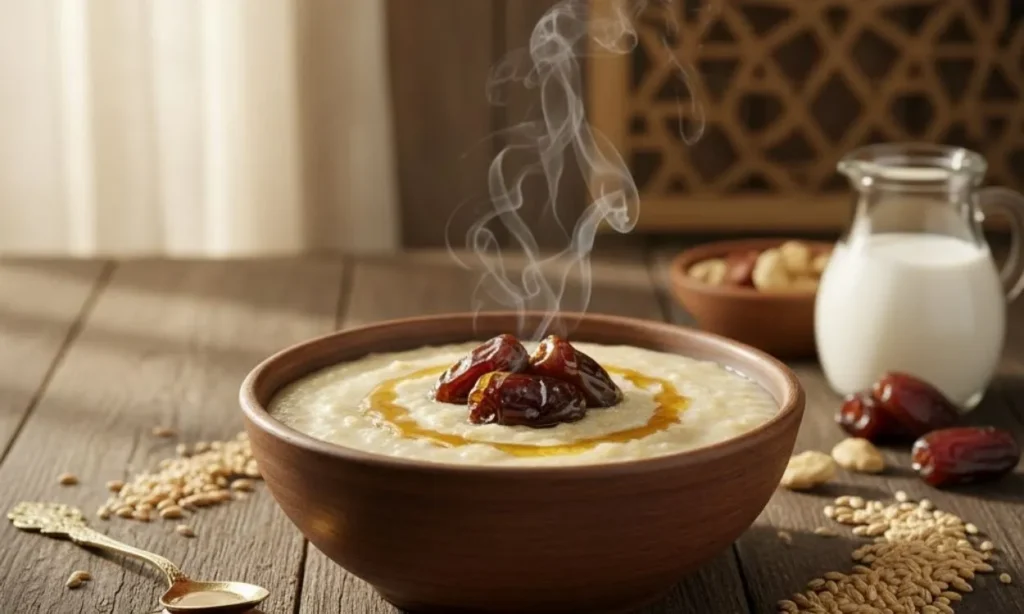In a world overflowing with supplements, diets, and modern “superfoods,” there lies a forgotten Sunnah remedy humble, warm, and comforting that heals not just the body but the heart and soul: Talbina.
When grief feels heavy and the mind weary, this prophetic porridge brings peace where medicine falls short. Beloved by Aisha (RA) and praised by the Prophet Muhammad ﷺ, Talbina is more than a meal it’s a spiritual therapy, a Sunnah for emotional healing, and a reminder that true wellness begins with faith.
The Sunnah Connection: A Dish of Healing and Mercy
Talbina is not a trendy health discovery it is a 1,400-year-old prophetic remedy, rooted in compassion and spiritual wisdom.
Aisha (RA) narrated:
“Whenever one of her relatives died, the women would gather and then return home. Aisha (RA) would order that a pot of Talbina be cooked and poured over Tharid (a dish of bread and meat). She would say:
‘Eat of it, for I heard the Messenger of Allah ﷺ say:
“The Talbina soothes the heart of the patient and relieves some of his sorrow.”’
Sahih al-Bukhari (Book 70, Hadith 45)
Another narration records the Prophet ﷺ saying:
“Talbina is disliked by the patient, yet it is beneficial.” Sahih al-Bukhari (Book 76, Hadith 13)
And in Sahih Muslim (Hadith 2216):
“The Talbina gives rest to the heart of the patient and removes sorrow.”
These words remind us that the Sunnah doesn’t just heal the body it nurtures the heart. Even if the taste is simple, its power is profound: it restores calm in times of distress, nourishes the weak, and brings light to hearts weighed down by grief.
What Is Talbina? A Humble Porridge With Divine Blessing
Talbina is a warm, creamy porridge made from barley flour or finely ground barley grains, gently cooked in milk or water, and often sweetened with dates, honey, or natural ingredients.
The Arabic word Talbina comes from laban (milk), describing its white, smooth texture. Traditionally, it was served as a light yet nourishing food for the sick, grieving, or those recovering from weakness. Today, it’s gaining recognition as a natural, prophetic superfood soothing to the stomach and the soul alike.
It can be served:
- As a breakfast for energy and clarity.
- As a healing drink during illness or emotional distress.
- Or as a dessert, similar to kheer or porridge, enriched with honey and nuts.
Each bowl of Talbina is a reminder: simplicity, when done with sincerity and Sunnah, carries divine healing.
Healing Benefits of Talbina: Where Faith Meets Science
The beauty of Talbina lies in how Prophetic wisdom aligns with modern science. Barley its main ingredient is a treasure of nutrients that modern research now praises for its health benefits.
Here’s how Talbina revives both the heart and body:
1. Promotes Emotional and Mental Well-Being
The Prophet ﷺ described Talbina as a remedy that “soothes the heart and relieves sorrow.”
Science now reveals why. Barley is naturally rich in magnesium, B-vitamins, and tryptophan, which help produce serotonin and dopamine hormones that stabilize mood and reduce anxiety.
Regular consumption of Talbina may help:
- Reduce symptoms of depression and stress.
- Calm the nervous system and promote restful sleep.
- Restore emotional balance after grief or fatigue.
This is why Aisha (RA) served Talbina to those mourning it nourished not only their body but also their emotional resilience.
2. Balances Blood Sugar and Sustains Energy
Unlike refined grains, barley has a low glycemic index. Its soluble fiber, beta-glucan, slows glucose absorption and stabilizes insulin levels.
That means Talbina releases energy slowly, avoiding sugar crashes perfect for diabetics or anyone seeking steady vitality throughout the day.
In the prophetic diet, balance was key — and Talbina embodies that balance beautifully.
3. Strengthens the Heart and Bones
Talbina’s beta-glucan fiber binds with cholesterol in the digestive tract, helping flush it out naturally reducing LDL (bad cholesterol) and improving heart health.
Barley is also rich in magnesium, phosphorus, and calcium, all vital for bone density and muscle strength.
It supports:
- Healthy blood circulation
- Strong bones and joints
- Stable blood pressure
A Sunnah remedy that guards the heart both emotionally and physically.
4. Improves Digestion and Gut Health
In prophetic medicine, digestive ease was seen as the foundation of health.
Talbina aids digestion by gently coating and soothing the stomach lining. It helps relieve:
- Constipation
- Bloating and gas
- Stomach inflammation
Its anti-inflammatory nature makes it suitable for people with sensitive stomachs or chronic digestive issues.
Truly, this Sunnah food is as kind to the gut as it is to the heart.

5. Boosts Immunity and Delays Aging
Barley is a natural source of zinc, selenium, and antioxidantscompounds that boost immune defense, repair tissues, and protect cells from oxidative stress.
Regular intake can enhance:
- Skin health and elasticity
- Immune system strength
- Cellular repair and detoxification
Talbina is proof that simple foods with barakah outperform complex diets without it.
How to Make Talbina (Prophetic Barley Porridge)
Ingredients
- ¼ cup hulled barley or ½ cup barley flour
- ½ liter milk (or water for a lighter version)
- 5–6 dates (deseeded) or 2 teaspoons date syrup
- 1 tablespoon honey (to taste)
- ½ teaspoon green cardamom powder (optional)
- 2 tablespoons chopped almonds
- 2 tablespoons chopped pistachios
Method
- Soak the barley overnight if using whole grains.
- Boil until soft (around 20 minutes). If using flour, cook directly in milk or water.
- Add the cooked barley and milk to a pot. Stir on low flame until it reaches a creamy, porridge-like texture.
- Mix in dates, honey, and cardamom powder.
- Turn off heat and top with almonds and pistachios.
- Serve warm as a nourishing breakfast or comforting dessert.
Optional Variations:
- Add a pinch of cinnamon or saffron for aroma.
- Use oat milk or almond milk for a plant-based version.
- Add raisins or shredded coconut for flavor and texture.
Each spoonful becomes an act of love, faith, and nourishment.
Reviving a Sunnah for the Modern Soul
In times of grief or sickness, Aisha (RA) would comfort her loved ones with Talbina a dish that healed hearts as much as it filled stomachs.
Today, when anxiety, depression, and chronic fatigue are widespread, reviving this Sunnah feels more urgent than ever.
Talbina reminds us that healing begins from within. It teaches us that nourishment isn’t only about calories it’s about connection:
- Connection to the Prophet’s ﷺ guidance,
- Connection to wholesome foods, and
- Connection to the peace that comes from living by Sunnah.
Let’s bring this forgotten Sunnah back into our homes and hearts one warm, soothing bowl at a time.
FAQs
1. Can Talbina be made without milk?
Yes. You can cook Talbina using water or plant-based milk like oat or almond milk. The consistency and nourishment remain rich.
2. Is Talbina only for those who are grieving or sick?
Not at all. While the Prophet ﷺ recommended it during illness and sorrow, its nutritional value benefits everyone students, elders, athletes, and even children.
3. Can children or pregnant women eat Talbina?
Yes. It’s safe and nourishing for both, provided there are no allergies to barley or gluten. It supports fetal development, improves maternal energy, and helps postpartum recovery.
4. How often should I have Talbina?
You can enjoy Talbina 1–3 times a week as a nutritious meal or whenever you need emotional calm and energy.
5. Does Talbina really help with depression and anxiety?
Yes both scientifically and spiritually. The magnesium and amino acids in barley support brain health, while following a Sunnah practice itself brings spiritual peace and purpose.
6. How long can Talbina be stored?
Store in the fridge for up to 2–3 days. Reheat gently and add a splash of milk or water before serving to restore its creamy consistency.
7. Can Talbina be given to the elderly?
Absolutely. It’s soft, easy to digest, and filled with nutrients that strengthen weak bodies and calm the heart.
